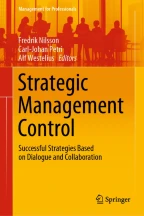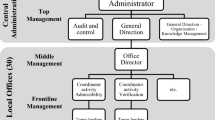Planning for Control and Evaluation

A fundamental aspect of all management control systems is its capacity to make organisations controllable and possible to evaluate. In a well-functioning management control system—especially one that is “strategic”—it can be expected that the metrics used, decisions being made and the responsibilities for these decisions are supporting strategy formulation and implementation. It is especially important that the structures and processes of the control system facilitate an internal strategic dialogue between managers and co-workers in planning, following-up and evaluating the objectives and strategies of the organisation. The chapter discusses some of the challenges of establishing strategic management control. One such challenge is how to establish a strategic dialogue that will help the organisation to develop in the desirable direction. Another, and closely related challenge, is how to ensure that the strategies chosen are implemented throughout the organisation when controls are not coordinated or aligned. Concepts like integrated control, management control package, control mix and ERP systems are used to discuss these and similar challenges. The discussions are based on our own experiences and insights as well as research findings.
This is a preview of subscription content, log in via an institution to check access.
Access this chapter
Subscribe and save
Springer+ Basic
€32.70 /Month
- Get 10 units per month
- Download Article/Chapter or eBook
- 1 Unit = 1 Article or 1 Chapter
- Cancel anytime
Buy Now
Price includes VAT (France)
eBook EUR 42.79 Price includes VAT (France)
Softcover Book EUR 52.74 Price includes VAT (France)
Hardcover Book EUR 79.11 Price includes VAT (France)
Tax calculation will be finalised at checkout
Purchases are for personal use only
Similar content being viewed by others

Stages of management control in a large public organization: from top to frontline managers
Article 30 April 2019

Managing Management Controls
Chapter © 2014

Managing through Uncertainty
Chapter © 2014
Notes
The organisation “Beyond Budgeting” strives to move “beyond command-and-control toward a management model that is more empowered and adaptive” (Source https://bbrt.org/what-is-beyond-budgeting/). Traditional budgeting techniques and processes are examples of command-and-control management models.
We strongly believe that the management control package is a pedagogical model that can be used in university courses, as well as by practitioners, wanting to discuss and analyse different controls and how they can be related. For the former use, see for example, the Swedish textbook “This is Management Control.” [in Swedish: “Det här är ekonomistyrning.”] by Nilsson and Olve (2018b). For the latter use, see for example, the Swedish book “The Controller handbook” [in Swedish: “Controllerhandboken”] edited by Nilsson and Olve (2018a), especially Chaps. 1 and 16.
References
- Almqvist, Roland, Graaf, Johan, Jannesson, Erik, Parment, Anders, and Skoog, Matti. 2016. Boken om ekonomistyrning. Lund: Studentlitteratur. Google Scholar
- Anthony, Robert N. 1965. Planning and Control Systems: A Framework for Analysis. Boston: Harvard University Graduate School of Business Administration. Google Scholar
- Anthony, Robert N., Govindarajan, Vijay, Hartmann, Frank G. H., Kraus, Kalle, and Nilsson, Göran. 2014. Management Control Systems. London: McGraw-Hill. Google Scholar
- Bedford, David S., and Malmi, Teemu. 2015. Configurations of control: An exploratory analysis. Management Accounting Research27(June), 2–26. Google Scholar
- Beyond budgeting. https://bbrt.org/what-is-beyond-budgeting/. Accessed November 12, 2019.
- Catasús, Bino. 2013. Nyckeltal—vad, varför och hur? In: Perspektiv på ekonomistyrning, eds. Jannesson, Erik, and Skoog, Matti, 141–160. Malmö: Liber. Google Scholar
- Cöster, Mathias, and Falk, Thomas. 2018. Datorisering i ett historiskt perspektiv: Från redovisningsdata till styrinformation. In: Digitalisering och Styrning, eds. Iveroth, Einar, Lindvall, Jan, and Magnusson, Johan, 115–131. Lund: Studentlitteratur. Google Scholar
- DiMaggio, Paul J., and Powell, Walter W. 1983. The iron cage revisited: Institutional isomorphism and collective rationality in organizational fields. American Sociological Review 48(2), 147–160. Google Scholar
- Grabner, Isabella, and Moers, Frank. 2013. Management control as a system or a package? Conceptual and empirical issues. Accounting, Organizations and Society38(6–7), 407–419. Google Scholar
- Jannesson, Erik. 2014. Driving strategic change at Saab AB: The use of new control practices. In: Strategy, Control and Competitive Advantage: Case study Evidence, eds. Jannesson, Erik, Nilsson, Fredrik, and Rapp, Birger, 27–57. Berlin/Heidelberg: Springer. Google Scholar
- Jannesson, Erik, Nilsson, Fredrik, and Rapp, Birger. (eds.) 2014. Strategy, Control and Competitive Advantage: Case Study Evidence. Berlin/Heidelberg: Springer. Google Scholar
- Johnson, H. Thomas, and Kaplan, Robert S. 1987. Relevance Lost: The Rise and Fall of Management Accounting. Boston: Harvard Business School Press. Google Scholar
- Kaplan, Robert S., and Norton, David P. 1992. The balanced scorecard: Measures that drive performance. Harvard Business Review 70(1), 71–79. Google Scholar
- Kaplan, Robert S., and Norton, David P. 1996. The Balanced Scorecard: Translating Strategy into Action. Boston: Harvard Business School Press. Google Scholar
- Kaplan, Robert S., and Norton, David P. 2004. Strategy Maps: Converting Intangible Assets into Tangible Outcomes. Boston: Harvard Business School Press. Google Scholar
- Lindvall, Jan, and Nilsson, Fredrik. 2009. Från traditionell till strategisk ekonomistyrning: kan affärssystemet hantera utmaningen? In: Temperaturen på affärssystem i Sverige, eds. Hedman, Jonas, Nilsson, Fredrik, and Westelius, Alf, 95–117. Lund: Studentlitteratur. Google Scholar
- Malmi, Teemu, and Brown, David A. 2008. Management control systems as a package—Opportunities, challenges and research directions. Management Accounting Research19(4), 287–300. Google Scholar
- Nilsson, Erik B. 2010. Strategi, styrning och konkurrenskraft—En longitudinell studie av Saab AB. Dissertation No. 1318. Linköping: Linköping Studies in Science and Technology. Google Scholar
- Nilsson, Fredrik, and Olve, Nils-Göran. 2018a. Controllerhandboken. Stockholm: Liber. Google Scholar
- Nilsson, Fredrik, and Olve, Nils-Göran. 2018b. Det här är ekonomistyrning. Lund: Studentlitteratur. Google Scholar
- Nilsson, Fredrik, Olve, Nils-Göran, and Parment, Anders. 2011. Controlling for Competitiveness: Strategy Formulation and Implementation through Management Control. Malmö/Copenhagen: Liber and Copenhagen Business School Press. Google Scholar
- Nilsson, Fredrik, and Stockenstrand, Anna-Karin. 2015. Financial Accounting and Management Control: The Tensions and Conflicts Between Uniformity and Uniqueness. Cham: Springer International Publishing Switzerland. Google Scholar
- Olve, Nils-Göran. 2014. Success through consistent strategy: How does Scania’s management control matter? In: Strategy, Control and Competitive Advantage: Case Study Evidence, eds. Jannesson, Erik, Nilsson, Fredrik, and Rapp, Birger, 85–105. Berlin/Heidelberg: Springer. Google Scholar
- Otley, David T., 1980. The contingency theory of management accounting: Achievement and prognosis. Accounting, Organizations and Society5(4), 413–428. Google Scholar
- Otley, David T., 2016. The contingency theory of management accounting and control: 1980–2014. Management Accounting Research31(June), 45–62. Google Scholar
- Roberts, John. 1990. Strategy and accounting in a U.K. conglomerate. Accounting, Organizations and Society 15(1–2), 107–126. Google Scholar
- Simons, Robert. 1995. Levers of Control: How Managers Use Innovative Control Systems to Drive Strategic Renewal. Boston: Harvard Business School Press. Google Scholar
- Wallander, Jan. 1999. Budgeting—An unnecessary evil. Scandinavian Journal of Management15(4), 405–421. Google Scholar
Author information
Authors and Affiliations
- Serus AB, Linköping, Sweden Erik Jannesson
- Uppsala University, Uppsala, Sweden Fredrik Nilsson
- Erik Jannesson


